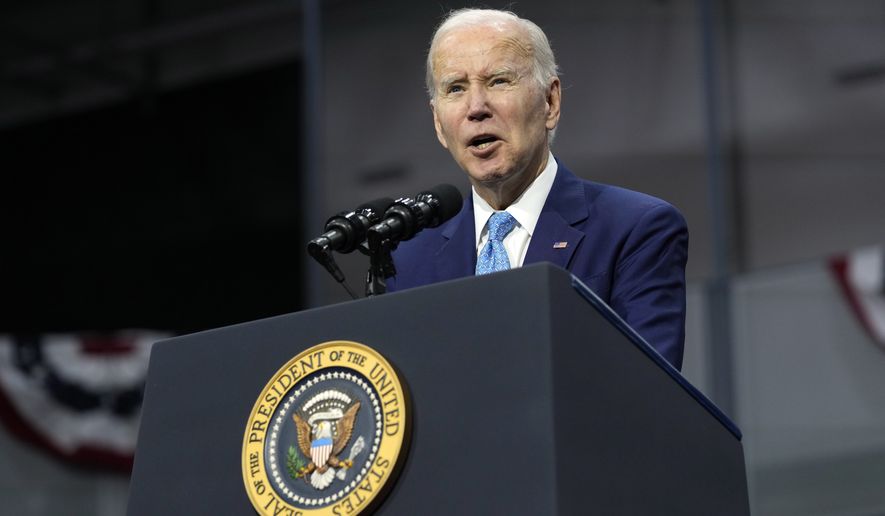Republicans are pressing President Biden to define the U.S. strategy in Ukraine as fears of a protracted war grow and support for continued military assistance softens.
Lawmakers hosted a series of hearings on the war in Ukraine on Tuesday, just days after the first anniversary of Russia’s invasion, as concerns over war fatigue compound fears of a protracted conflict.
Sen. Roger Wicker of Mississippi, the top Republican on the Senate Armed Services Committee, warned that the war is reaching an “inflection point” and that without a clearly articulated strategy by the Biden administration, sending aid to Ukraine is becoming a tough sell to U.S. taxpayers.
“I appreciated President Biden’s visit to Ukraine and Poland last week,” Mr. Wicker said. “What I do not appreciate is the president’s repeated failure to articulate the U.S. goals and interests in Ukraine in a fashion that resonates with most Americans.
“In my view, this is not a particularly difficult case to make,” he said. “Our support to Ukraine helps a capable, motivated and grateful partner nation restore stability to a region of the world that is critical to our interests.”
Mr. Wicker argued that the administration’s failure to deter Russia from mounting the invasion and its apprehension about providing certain arms to Ukraine over fears of escalating the war has only served to draw the war out further.
“We need to learn our lessons from the slow-roll approach we have used to arm the Ukrainians thus far,” he said. “We are at a pivotal moment in this war, an inflection point we cannot afford to waste as we go about defending the interests of the United States and our allies.”
Those concerns were echoed more forcefully by retired Army Lt. Gen. Keith Kellogg, who chairs the Center for American Security’s America First Policy Institute. He warned the Senate panel that the U.S. could not afford to let the war in Ukraine drag on.
“Simply saying ‘whatever it takes, as long as it takes’ is not policy, it’s a slogan,” he said. “No number of supplemental aid packages, no round of sanctions, nor a presidential visit a Kyiv will achieve success without planning.
“The identification of an end state for how this will end with a road map to get there must be communicated effectively to the American people,” he said.
The pointed criticism over the administration’s strategy in Ukraine comes amid growing concern over softening support for the war among the American public.
Congress approved roughly $113 billion in economic, humanitarian, and military aid for Ukraine in 2022.
According to a poll from The Associated Press-NORC Center for Public Affairs Research, 48% of Americans say they support the U.S. continuing to provide weapons to Ukraine, while 29% say they oppose and 22% neither favor nor oppose the shipments.
That is down from 60% who said they were in favor of the U.S. sending weapons in May, less than three months into the war.
Just 37% of Americans favor sending government funds to Ukraine, while 37% oppose and 23% neither favor nor oppose, according to the poll.
Just 26% of those polled say the U.S. should play a “major” role in the conflict between Russia and Ukraine, down from 40% in March 2022. Forty-nine percent say the U.S. should still play a “minor” role in the war. Almost a quarter of the public says the U.S. should not have a role at all.
Lt. Gen. Kellogg warned that the war in Ukraine cannot continue under the status quo.
“We need to work towards an end of this war and do so immediately and decisively,” he said.
“If this war turns into a multiple-year war of attrition, which is its present trajectory, then Americans may be asked to sacrifice more than they’re willing to give and Ukraine will lose,” he said. “As it stands now, a Ukrainian defeat is an American defeat by proxy. This cannot be tolerated.”
Some Republicans have voiced skepticism or outright resistance to U.S. aid for Ukraine, and those calls have intensified as the White House acknowledges there is no end in sight for Ukrainian forces to drive out the Russian invaders.
While most Republican lawmakers remain committed to providing support to help Ukraine defend itself, party leaders have said such support is not an unreviewable blank check.
House Armed Services Committee Chairman Mike Rogers, Alabama Republican, sought to assure taxpayers that their dollars were being put to good use in a separate hearing on Tuesday with Pentagon officials overseeing funds to Ukraine.
Democrats on both panels praised Mr. Biden’s efforts to rally bipartisan support for Ukraine in Congress and defended the administration’s approach to fielding weapons to Ukraine in a quickly changing battlefield.
Rep. Adam Smith of Washington, the top Democrat on the Armed Services panel said Ukraine’s yearlong defense against Russia is proof that the aid has been put to appropriate use.
Pentagon officials assured the lawmakers that there has been no evidence that any aid had been pilfered through corruption or that any weapons had ended up in the wrong hands.
But Mr. Rogers warned that oversight over U.S. aid to Ukraine “is about more than just accounting.”
“It’s about ensuring the administration is setting strategic goals and implementing a policy to achieve them,” he said. “That is where I have very real concerns.”
Mr. Rogers echoed Mr. Wicker’s criticism of the administration’s slow rollout of aid to Ukraine, and warned that further hesitation would only prolong the war.
“This conflict must end,” Mr. Rogers said. “And the president must be willing to do what it takes to end it.”
• Joseph Clark can be reached at jclark@washingtontimes.com.




Please read our comment policy before commenting.